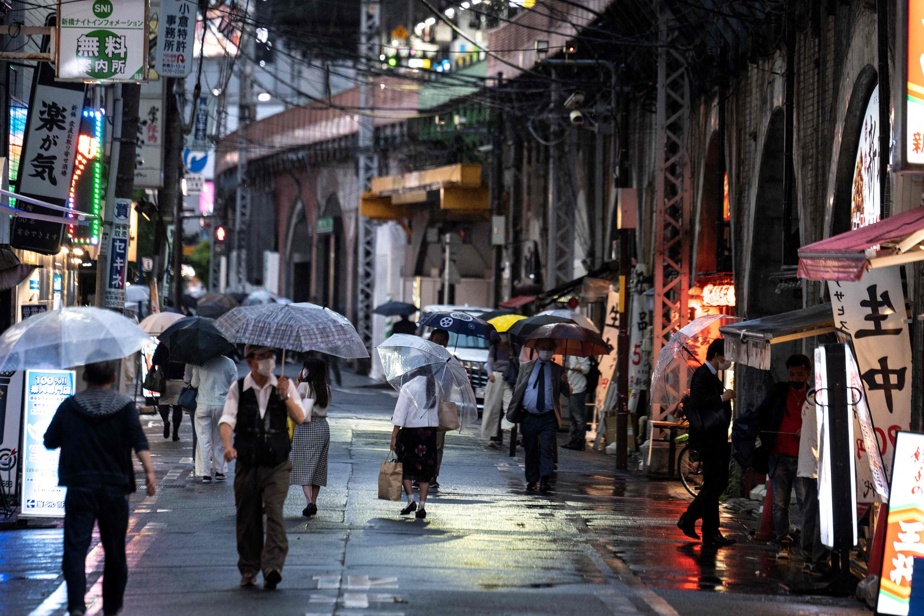(TOKYO) On Friday, the Japanese government again extended the state of emergency in effect in a part of the archipelago to confront COVID-19, until now June 20, nearly a month before the Tokyo Olympics open (July 23-August 8).
“The number of new cases has decreased since mid-May, but the situation is still not certain,” said Prime Minister Yoshihide Suga.
The state of emergency, which was already extended for three weeks in May, currently concerns 10 of the 47 Japanese provinces, including Tokyo and its environs, Osaka or Kyoto (the west).
However, this device is much lighter than the containment measures imposed elsewhere in the world. It mainly consisted of forcing bars and restaurants to close at 8 pm, and requiring them not to serve alcohol.
The Japanese archipelago has relatively escaped the epidemic with around 12,700 official deaths recorded since early 2020, according to an updated report on Friday, but is currently experiencing a fourth wave of the Coronavirus.
The Japanese government is under fire for its handling of the health crisis, the slow pace of the vaccination program and its insistence on preserving the Olympic Games, which have involved the arrival of tens of thousands of athletes, officials and journalists from all over the world.
Wed, Japanese newspaper AsahiThe official partner of the Games and the second national daily newspaper in terms of distribution demanded the cancellation of the event, which he described as a “health hazard.”
‘Awareness’ of interests
Multiple polls in recent months show that Japanese people are extremely reluctant to host the Games, although calls to demonstrate have not attracted many people yet.
Some major corporate leaders in the non-partner country also expressed their opposition and new medical societies joined the anti-JO concert this week, citing in particular the potential spread of variants.
In March, the organizers decided to block the access of spectators from outside, for the first time in the history of the Olympics. They must decide in June about the presence or absence of bystanders residing in Japan.
“I think the number of supporters […] “It will be decided after the state of emergency is lifted,” said Seiko Hashimoto, chairman of the organizing committee for the Tokyo 2020 Olympics, on Friday.
Mr. Suga said he was “aware” of the concerns of many of his countrymen about the Olympics. “We hear their voices and are preparing for safe games,” he said.
He also indicated that the athletes would not have contact with the local population and that the number of official representatives and media from abroad should be drastically reduced.
Athletes impatience
The vast majority of selected athletes around the world eagerly prepare for the Olympics, even if some express reservations. World number one tennis player Novak Djokovic said on Thursday that he would reconsider his participation if the fans were not allowed.
US President Joe Biden was in favor of holding the games in April, and on Thursday, the European Union endorsed the event, “a symbol of global unity for the defeat of COVID-19”.
Ursula von der Leyen, President of the European Commission, stressed Thursday that the permission granted by the European Union to export more than 100 million doses of vaccines to Japan was “a strong sign of our support for the preparation and security of the Olympic Games. These Games.”
Japan, the world’s third largest economy, is behind its vaccination program: Less than 2.5% of the country’s population has received two doses so far, mainly due to routine.
However, this campaign is showing the first signs of acceleration. On Friday, Suga estimated that an average of one million shots per day could be reached after mid-June, compared to an average of 400,000 shots per day now.
General elections in the country should be held no later than October. The prime minister’s popularity has plummeted in recent months, but his conservative party, the Liberal Democratic Party (PLD), which has dominated Japanese politics for more than half a century, has never really been threatened by the prime minister. The moment the opposition emerges is weak and divided, according to experts.

“Pop culture maven. Unapologetic student. Avid introvert. Gamer. Problem solver. Tv fanatic.”

